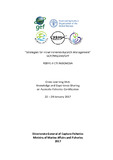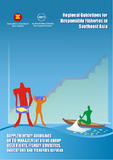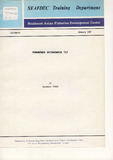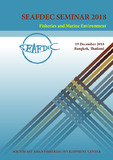Cross Learning Visit: Knowledge and Experience Sharing on Australia Fisheries Certification, 22 – 29 January 2017
Description
Developing countries have significantly contributed for providing fisheries resources to their human populations. However, the high emphasis on increasing productivity sometimes has led to inadequate management and control of fishing activities, especially in trawl fisheries, resulting in excessive fishing effort and environmental degradation.
In the global market, continuous shrimp supply is needed by shrimp industry from desirably sustainable fishing. Furthermore, certain markets require fishery certifications to ensure traceability data and information of the fishery products.
Several countries such as the USA and Australia have implemented certification of fishing activities. Indonesia has implemented some fishery certification programs such as catch certification and good handling practices on board (mostly required by EU), catch documentation schemes (mostly required by RFMO / CCSBT on tuna products). Through the fishery certification it is expected to increase the price (premium price) and achieve expansion of market.
The application of fishery certification is also encouraged for prawn fishery especially in the Aru and Arafura Seas to ensure sustainability of existing prawn resources. In 2012, the Research and Development Agency of the MMAF worked together with WWF-Indonesia on a study that resulted in six recommendations for application of a certification standard (in this case MSC) for prawn fishery in Aru and Arafura Seas, as follows:
1. To strengthen fisheries governance systems which relate to the shrimp trawl fishery;
2. To create a management framework which ensures the sustainability of the target species;
3. To ensure that the application of the ecosystem approach to fisheries management is integrated into shrimp management policy;
4. To provide a system of strong compliance and facilitating industry participation in all aspects of decision making;
5. To facilitate the development of positive business and social drivers linked to improved fishing practices and market incentives;
6. To create a monitoring and evaluation framework to assess results of blue-print implementation.
In line with this, there is a need in Indonesia to learn from countries that have implemented fishery certification such as Australia, where its fishery industry has applied certification (prawn trawl and tuna fishery certifications) done by Marine Stewardship Council (MSC).
Citation
Knowledge and Experience Sharing on Australia Fisheries Certification in Strategies for Trawl Fisheries Bycatch Management”.(2017). Indonesia.
Collections
- Country Activities [95]
Related items
Showing items related by title, author, creator and subject.
-
Regional Guidelines for Responsible Fisheries in Southeast Asia Supplementary Guidelines on Co-Management Using Group User Rights,Fisheries Statistics, Indicators and Fisheries Refugia
SEAFDEC,ASSOCIATION OF SOUTHEAST ASIAN NATIONS (SEAFDEC, 2006-03)The Guidelines on “Use of Indicators for the Sustainable Development and Management of Capture Fisheries” which is to large extent related to fishery statistics, was developed to complement the programs on statistics, thus, ... -
Fisheries Economics (I)
Yamao, Masahiro (Training Department, Southeast Asian Fisheries Development Center, 1987-01)This textbook was initially prepared as part of the lectures on Fisheries Economics at SEAFDEC, in 1986. The contents are obviously not only introductory but also essential to our subject. In addition to my summarized ... -
SEAFDEC Seminar 2018: Fisheries and Marine Environment
Southeast Asian Fisheries Development Center, Training Department (Training Department, Southeast Asian Fisheries Development Center, 2018)Proceeding of SEAFDEC Seminar 2018: Fisheries and Marine Environment




